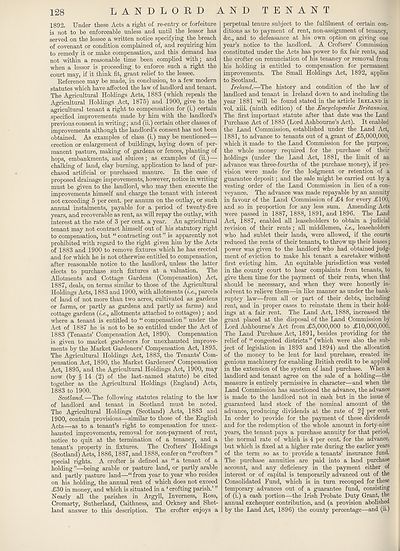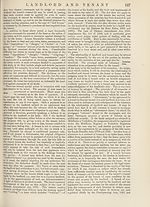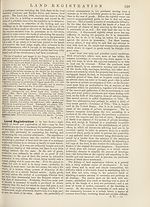New volumes of the Encyclopædia Britannica > Volume 30, K-MOR
(152) Page 128
Download files
Complete book:
Individual page:
Thumbnail gallery: Grid view | List view

LANDLORD AND TENANT
128
1892. Under these Acts a right of re-entry or forfeiture
is not to be enforceable unless and until the lessor has
served on the lessee a written notice specifying the breach
of covenant or condition complained of, and requiring him
to remedy it or make compensation, and this demand has
not within a reasonable time been complied with; and
when a lessor is proceeding to enforce such a right the
court may, if it think fit, grant relief to the lessee.
Reference may be made, in conclusion, to a few modern
statutes which have affected the law of landlord and tenant.
The Agricultural Holdings Acts, 1883 (which repeals the
Agricultural Holdings Act, 1875) and 1900, give to the
agricultural tenant a right to compensation for (i.) certain
specified improvements made by him with the landlord’s
previous consent in writing; and (ii.) certain other classes of
improvements although the landlord’s consent has not been
obtained. As examples of class (i.) may be mentioned—
erection or enlargement of buildings, laying down of per¬
manent pasture, making of gardens or fences, planting of
hops, embankments, and sluices; as examples of (ii.) —
chalking of land, clay burning, application to land of pur¬
chased artificial or purchased manure. In the case of
proposed drainage improvements, however, notice in writing
must be given to the landlord, who may then execute the
improvements himself and charge the tenant with interest
not exceeding 5 per cent, per annum on the outlay, or such
annual instalments, payable for a period of twenty-five
years, and recoverable as rent, as will repay the outlay, with
interest at the rate of 3 per cent, a year. An agricultural
tenant may not contract himself out of his statutory right
to compensation, but “ contracting out ” is apparently not
prohibited with regard to the right given him by the Acts
of 1883 and 1900 to remove fixtures which he has erected
and for which he is not otherwise entitled to compensation,
after reasonable notice to the landlord, unless the latter
elects to purchase such fixtures at a valuation. The
Allotments and Cottage Gardens (Compensation) Act,
1887, deals, on terms similar to those of the Agricultural
Holdings Acts, 1883 and 1900, with allotments (i.e., parcels
of land of not more than two acres, cultivated as gardens
or farms, or partly as gardens and partly as farms) and
cottage gardens {i.e., allotments attached to cottages) ; and
where a tenant is entitled to “ compensation ” under the
Act of 1887 he is not to be so entitled under the Act of
1883 (Tenants’ Compensation Act, 1890). Compensation
is given to market gardeners for unexhausted improve¬
ments by the Market Gardeners’ Compensation Act, 1895.
The Agricultural Holdings Act, 1883, the Tenants’ Com¬
pensation Act, 1890, the Market Gardeners’ Compensation
Act, 1895, and the Agricultural Holdings Act, 1900, may
now (by § 14 (2) of the last-named statute) be cited
together as the Agricultural Holdings (England) Acts,
1883 to 1900.
Scotland. — The following statutes relating to the law
of landlord and tenant in Scotland must be noted.
The Agricultural Holdings (Scotland) Acts, 1883 and
1900, contain provisions—similar to those of the English
Acts—as to a tenant’s right to compensation for unex¬
hausted improvements, removal for non-payment of rent,
notice to quit at the termination of a tenancy, and a
tenant’s property in fixtures. The Crofters’ Holdings
(Scotland) Acts, 1886,1887, and 1888, confer on “crofters ”
special rights. A crofter is defined as “ a tenant of a
holding ”—being arable or pasture land, or partly arable
and partly pasture land—“ from year to year who resides
on his holding, the annual rent of which does not exceed
£30 in money, and which is situated in a ‘ crofting parish.’ ”
Nearly all the parishes in Argyll, Inverness, Ross,
Cromarty, Sutherland, Caithness, and Orkney and Shet¬
land answer to this description. The crofter enjoys a
perpetual tenure subject to the fulfilment of certain con¬
ditions as to payment of rent, non-assignment of tenancy,
&c., and to defeasance at his own option on giving one
year’s notice to the landlord. A Crofters’ Commission
constituted under the Acts has power to fix fair rents, and
the crofter on renunciation of his tenancy or removal from
his holding is entitled to compensation for permanent
improvements. The Small Holdings Act, 1892, applies
to Scotland.
Ireland.—The history and condition of the law of
landlord and tenant in Ireland down to and including the
year 1881 will be found stated in the article Ireland in
vol. xiii. (ninth edition) of the Encyclopaedia Britannica.
The first important statute after that date was the Land
Purchase Act of 1885 (Lord Ashbourne’s Act). It enabled
the Land Commission, established under the Land Act,
1881, to advance to tenants out of a, grant of £5,000,000,
which it made to the Land Commission for the purpose,
the whole money required for the purchase of their
holdings (under the Land Act, 1881, the limit of an
advance was three-fourths of the purchase money), if pro¬
vision were made for the lodgment or retention of a
guarantee deposit; and the sale might be carried out by a
vesting order of the Land Commission in lieu of a con¬
veyance. The advance was made repayable by an annuity
in favour of the Land Commission of £4 for every £100,
and so in proportion for any less sum. Amending Acts
were passed in 1887, 1888, 1891, and 1896. The Land
Act, 1887, enabled all leaseholders to obtain a judicial
revision of their rents; all middlemen, i.e., leaseholders
who had sublet their lands, were allowed, if the courts
reduced the rents of their tenants, to throw up their leases;
power was given to the landlord who had obtained judg¬
ment of eviction to make his tenant a caretaker without
first evicting him. An equitable jurisdiction was vested
in the county court to hear complaints from tenants, to
give them time for the payment of their rents, when that
should be necessary, and when they were honestly in¬
solvent to relieve them—in like manner as under the bank¬
ruptcy law—from all or part of their debts, including
rent, and in proper cases to reinstate them in their hold¬
ings at a fair rent. The Land Act, 1888, increased the
grant placed at the disposal of the Land Commission by
Lord Ashbourne’s Act from £5,000,000 to £10,000,000..
The Land Purchase Act, 1891, besides providing for the
relief of “ congested districts ” (which were also the sub¬
ject of legislation in 1893 and 1894) and the allocation
of the money to be lent for land purchase, created in¬
genious machinery for enabling British credit to be applied
in the extension of the system of land purchase. When a
landlord and tenant agree on the sale of a holding—the
measure is entirely permissive in character—and when the
Land Commission has sanctioned the advance, the advance
is made to the landlord not in cash but in the issue of
guaranteed land stock of the nominal amount of the
advance, producing dividends at the rate of 2f per cent.
In order to provide for the payment of these dividends
and for the redemption of the whole amount in forty-nine
years, the tenant pays a purchase annuity for that period,
the normal rate of which is 4 per cent, for the advance,
but which is fixed at a higher rate during the earlier years
of the term so as to provide a tenants’ insurance fund.
The purchase annuities are paid into a land purchase
account, and any deficiency in the payment either of
interest or of capital is temporarily advanced out of the
Consolidated Fund, which is in turn recouped for these
temporary advances out of a guarantee fund, consisting
of (i.) a cash portion—the Irish Probate Duty Grant, the
annual exchequer contribution, and (a provision abolished
I by the Land Act, 1896) the county percentage—and (ii.)
128
1892. Under these Acts a right of re-entry or forfeiture
is not to be enforceable unless and until the lessor has
served on the lessee a written notice specifying the breach
of covenant or condition complained of, and requiring him
to remedy it or make compensation, and this demand has
not within a reasonable time been complied with; and
when a lessor is proceeding to enforce such a right the
court may, if it think fit, grant relief to the lessee.
Reference may be made, in conclusion, to a few modern
statutes which have affected the law of landlord and tenant.
The Agricultural Holdings Acts, 1883 (which repeals the
Agricultural Holdings Act, 1875) and 1900, give to the
agricultural tenant a right to compensation for (i.) certain
specified improvements made by him with the landlord’s
previous consent in writing; and (ii.) certain other classes of
improvements although the landlord’s consent has not been
obtained. As examples of class (i.) may be mentioned—
erection or enlargement of buildings, laying down of per¬
manent pasture, making of gardens or fences, planting of
hops, embankments, and sluices; as examples of (ii.) —
chalking of land, clay burning, application to land of pur¬
chased artificial or purchased manure. In the case of
proposed drainage improvements, however, notice in writing
must be given to the landlord, who may then execute the
improvements himself and charge the tenant with interest
not exceeding 5 per cent, per annum on the outlay, or such
annual instalments, payable for a period of twenty-five
years, and recoverable as rent, as will repay the outlay, with
interest at the rate of 3 per cent, a year. An agricultural
tenant may not contract himself out of his statutory right
to compensation, but “ contracting out ” is apparently not
prohibited with regard to the right given him by the Acts
of 1883 and 1900 to remove fixtures which he has erected
and for which he is not otherwise entitled to compensation,
after reasonable notice to the landlord, unless the latter
elects to purchase such fixtures at a valuation. The
Allotments and Cottage Gardens (Compensation) Act,
1887, deals, on terms similar to those of the Agricultural
Holdings Acts, 1883 and 1900, with allotments (i.e., parcels
of land of not more than two acres, cultivated as gardens
or farms, or partly as gardens and partly as farms) and
cottage gardens {i.e., allotments attached to cottages) ; and
where a tenant is entitled to “ compensation ” under the
Act of 1887 he is not to be so entitled under the Act of
1883 (Tenants’ Compensation Act, 1890). Compensation
is given to market gardeners for unexhausted improve¬
ments by the Market Gardeners’ Compensation Act, 1895.
The Agricultural Holdings Act, 1883, the Tenants’ Com¬
pensation Act, 1890, the Market Gardeners’ Compensation
Act, 1895, and the Agricultural Holdings Act, 1900, may
now (by § 14 (2) of the last-named statute) be cited
together as the Agricultural Holdings (England) Acts,
1883 to 1900.
Scotland. — The following statutes relating to the law
of landlord and tenant in Scotland must be noted.
The Agricultural Holdings (Scotland) Acts, 1883 and
1900, contain provisions—similar to those of the English
Acts—as to a tenant’s right to compensation for unex¬
hausted improvements, removal for non-payment of rent,
notice to quit at the termination of a tenancy, and a
tenant’s property in fixtures. The Crofters’ Holdings
(Scotland) Acts, 1886,1887, and 1888, confer on “crofters ”
special rights. A crofter is defined as “ a tenant of a
holding ”—being arable or pasture land, or partly arable
and partly pasture land—“ from year to year who resides
on his holding, the annual rent of which does not exceed
£30 in money, and which is situated in a ‘ crofting parish.’ ”
Nearly all the parishes in Argyll, Inverness, Ross,
Cromarty, Sutherland, Caithness, and Orkney and Shet¬
land answer to this description. The crofter enjoys a
perpetual tenure subject to the fulfilment of certain con¬
ditions as to payment of rent, non-assignment of tenancy,
&c., and to defeasance at his own option on giving one
year’s notice to the landlord. A Crofters’ Commission
constituted under the Acts has power to fix fair rents, and
the crofter on renunciation of his tenancy or removal from
his holding is entitled to compensation for permanent
improvements. The Small Holdings Act, 1892, applies
to Scotland.
Ireland.—The history and condition of the law of
landlord and tenant in Ireland down to and including the
year 1881 will be found stated in the article Ireland in
vol. xiii. (ninth edition) of the Encyclopaedia Britannica.
The first important statute after that date was the Land
Purchase Act of 1885 (Lord Ashbourne’s Act). It enabled
the Land Commission, established under the Land Act,
1881, to advance to tenants out of a, grant of £5,000,000,
which it made to the Land Commission for the purpose,
the whole money required for the purchase of their
holdings (under the Land Act, 1881, the limit of an
advance was three-fourths of the purchase money), if pro¬
vision were made for the lodgment or retention of a
guarantee deposit; and the sale might be carried out by a
vesting order of the Land Commission in lieu of a con¬
veyance. The advance was made repayable by an annuity
in favour of the Land Commission of £4 for every £100,
and so in proportion for any less sum. Amending Acts
were passed in 1887, 1888, 1891, and 1896. The Land
Act, 1887, enabled all leaseholders to obtain a judicial
revision of their rents; all middlemen, i.e., leaseholders
who had sublet their lands, were allowed, if the courts
reduced the rents of their tenants, to throw up their leases;
power was given to the landlord who had obtained judg¬
ment of eviction to make his tenant a caretaker without
first evicting him. An equitable jurisdiction was vested
in the county court to hear complaints from tenants, to
give them time for the payment of their rents, when that
should be necessary, and when they were honestly in¬
solvent to relieve them—in like manner as under the bank¬
ruptcy law—from all or part of their debts, including
rent, and in proper cases to reinstate them in their hold¬
ings at a fair rent. The Land Act, 1888, increased the
grant placed at the disposal of the Land Commission by
Lord Ashbourne’s Act from £5,000,000 to £10,000,000..
The Land Purchase Act, 1891, besides providing for the
relief of “ congested districts ” (which were also the sub¬
ject of legislation in 1893 and 1894) and the allocation
of the money to be lent for land purchase, created in¬
genious machinery for enabling British credit to be applied
in the extension of the system of land purchase. When a
landlord and tenant agree on the sale of a holding—the
measure is entirely permissive in character—and when the
Land Commission has sanctioned the advance, the advance
is made to the landlord not in cash but in the issue of
guaranteed land stock of the nominal amount of the
advance, producing dividends at the rate of 2f per cent.
In order to provide for the payment of these dividends
and for the redemption of the whole amount in forty-nine
years, the tenant pays a purchase annuity for that period,
the normal rate of which is 4 per cent, for the advance,
but which is fixed at a higher rate during the earlier years
of the term so as to provide a tenants’ insurance fund.
The purchase annuities are paid into a land purchase
account, and any deficiency in the payment either of
interest or of capital is temporarily advanced out of the
Consolidated Fund, which is in turn recouped for these
temporary advances out of a guarantee fund, consisting
of (i.) a cash portion—the Irish Probate Duty Grant, the
annual exchequer contribution, and (a provision abolished
I by the Land Act, 1896) the county percentage—and (ii.)
Set display mode to:
![]() Universal Viewer |
Universal Viewer | ![]() Mirador |
Large image | Transcription
Mirador |
Large image | Transcription
Images and transcriptions on this page, including medium image downloads, may be used under the Creative Commons Attribution 4.0 International Licence unless otherwise stated. ![]()
| Encyclopaedia Britannica > New volumes of the Encyclopædia Britannica > Volume 30, K-MOR > (152) Page 128 |
|---|
| Permanent URL | https://digital.nls.uk/193569477 |
|---|
| Attribution and copyright: |
|
|---|---|
| Shelfmark | EB.18 |
|---|---|
| Description | Ten editions of 'Encyclopaedia Britannica', issued from 1768-1903, in 231 volumes. Originally issued in 100 weekly parts (3 volumes) between 1768 and 1771 by publishers: Colin Macfarquhar and Andrew Bell (Edinburgh); editor: William Smellie: engraver: Andrew Bell. Expanded editions in the 19th century featured more volumes and contributions from leading experts in their fields. Managed and published in Edinburgh up to the 9th edition (25 volumes, from 1875-1889); the 10th edition (1902-1903) re-issued the 9th edition, with 11 supplementary volumes. |
|---|---|
| Additional NLS resources: |
|

